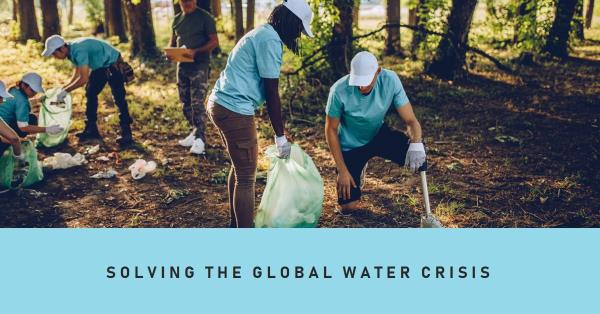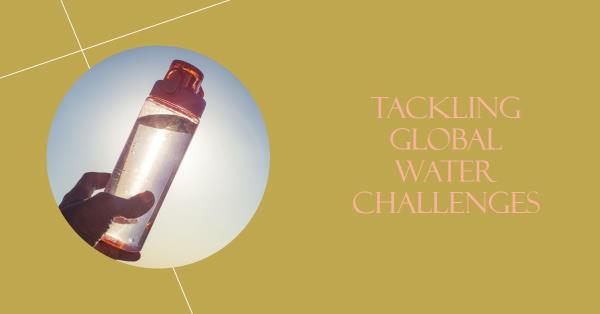Table of Contents
ToggleNavigating Global Water Problems: Issues and Solutions

Water, the source of life, is facing unprecedented challenges across the globe. As we explore the water problems plaguing our planet, we’ll delve into the intricacies of the crisis, from its global reach to the root causes and potential solutions. Join us on this journey to understand the severity of the water issues we face and how we can collectively work towards a sustainable water future.
The Water Problem Around the World: Water problems vary, but some common issues persist globally. Water scarcity, pollution, inadequate access to clean water, and unsustainable water management practices are prevalent challenges that impact communities, ecosystems, and economies on a widespread scale.

The 4 Main Causes of the Global Water Crisis:
Climate Change: Altered precipitation patterns, rising temperatures, and extreme weather events contribute to droughts and floods, exacerbating water scarcity.
Population Growth: The increasing global population puts additional pressure on water resources for agriculture, industry, and domestic use.
Pollution: Industrial discharges, agricultural runoff, and untreated sewage pollute water sources, compromising water quality and threatening human health.
Unsustainable Water Use: Inefficient irrigation practices, over-extraction of groundwater, and wasteful water consumption contribute to the depletion of water resources.
What Country Has the Worst Water Problems? Several countries face severe water problems, but Yemen is often cited as having one of the worst water crises. Conflict, population displacement, and limited access to water resources have left a large portion of the population without reliable and safe water sources.
Are We Running Out of Fresh Water? While Earth has a finite amount of freshwater, the concern is more about the uneven distribution and unsustainable use rather than running out globally. Regions facing water scarcity need sustainable management practices to ensure a consistent and equitable supply of freshwater.
Are We Going to Run Out of Water? The risk of running out of water is contingent on global and local efforts to manage water sustainably. Urgent action, including conservation, efficient use, and investment in water infrastructure, is crucial to prevent water scarcity from reaching critical levels.
How Can We Solve the Water Crisis?
Water Conservation: Implementing water-saving practices at the individual and community levels, such as fixing leaks, using water-efficient appliances, and practicing mindful water consumption.
Sustainable Agriculture: Adopting water-efficient farming practices, precision irrigation, and crop selection suitable for local climates to minimize water use in agriculture.
Investment in Infrastructure: Upgrading and investing in water infrastructure, including efficient irrigation systems, wastewater treatment plants, and smart water grids to optimize water distribution.
Community Engagement: Empowering local communities to actively participate in water management decisions fosters a sense of responsibility and ensures that solutions are tailored to the specific needs of each region.
International Collaboration: Collaborative efforts among nations, sharing knowledge, technology, and best practices, are essential for effective water management and conservation on a global scale.
The Global Impact of Water Scarcity
As the global population continues to grow and climate change accelerates, the impact of water scarcity becomes more profound. Beyond the immediate challenges faced by individual countries, the global community experiences far-reaching consequences. Some key aspects include:
- Economic Ramifications: Water scarcity can hamper economic development and lead to increased poverty. Industries that heavily rely on water, such as agriculture and manufacturing, may face disruptions, resulting in job losses and economic downturns.
- Health Concerns: Limited access to clean water contributes to waterborne diseases, affecting millions of people worldwide. Contaminated water sources become breeding grounds for diseases like cholera, dysentery, and typhoid, posing a significant threat to public health.
- Environmental Degradation: Ecosystems suffer as water scarcity disrupts natural water cycles. Aquatic habitats dwindle, affecting biodiversity, and the lack of water contributes to soil erosion and desertification in various regions.
- Social Conflicts: Competition for scarce water resources can exacerbate existing social tensions and lead to conflicts. Access to water becomes a geopolitical issue, with disputes arising between neighboring countries and communities.
Innovative Solutions to Address Water Scarcity
To tackle the global water crisis, innovative solutions are essential. These solutions encompass technological advancements, sustainable practices, and international cooperation:
- Advanced Water Treatment Technologies: Investing in advanced water treatment technologies helps purify contaminated water, making it suitable for consumption. Innovations like desalination, water recycling, and efficient filtration methods play a crucial role in ensuring a sustainable water supply.
- Smart Water Management: Implementing smart water management systems involves using data and technology to optimize water distribution. These systems can detect leaks, monitor usage patterns, and provide real-time insights to enhance efficiency and reduce wastage.
- Green Infrastructure: Integrating green infrastructure, such as rainwater harvesting systems, permeable pavements, and green roofs, can help capture and store water. These sustainable solutions contribute to replenishing groundwater and mitigating the impact of water scarcity.
- Drought-Resistant Crops: Research and development in agriculture focus on creating drought-resistant crop varieties. These crops require less water, making them suitable for regions prone to water scarcity. Precision agriculture techniques also help optimize water usage in farming.
- Education and Awareness: Promoting water conservation and awareness campaigns on a global scale is crucial. Educating communities about the value of water, the importance of conservation, and sustainable practices fosters a sense of responsibility.
- International Collaboration: Addressing the global water crisis requires collaborative efforts among nations. Sharing best practices, technology, and expertise on a global scale can lead to more effective water management strategies.
The Role of Individuals in Water Conservation
Individuals also play a vital role in addressing the global water crisis through everyday actions:
- Water-Efficient Practices: Adopting water-efficient practices at home, such as fixing leaks, using water-saving appliances, and practicing mindful water consumption, can contribute to significant water savings.
- Reducing Water Footprint: Being conscious of daily activities that contribute to water consumption, such as dietary choices and clothing purchases, can help reduce individual water footprints.
- Supporting Water Conservation Initiatives: Supporting organizations and initiatives focused on water conservation and sustainable water management contributes to larger-scale efforts in addressing the global water crisis.
By combining innovative solutions, international collaboration, and individual efforts, the global community can work towards a future where water scarcity is minimized, and access to clean water is a universal reality.
Global Water Problems - Frequently Asked Questions (FAQ)
What is the global water problem?
The global water problem refers to the widespread issues surrounding the availability, quality, and access to water resources on a global scale. It includes challenges related to water scarcity, pollution, and inadequate water infrastructure.
What are the problems from water?
Water-related problems encompass issues such as water scarcity, pollution, waterborne diseases, food insecurity, economic losses, and conflicts arising from competition for water resources.
What are the five major threats to the global water system?
The five major threats to the global water system include over-extraction of groundwater, pollution from industrial and agricultural activities, inadequate water management, climate change, and population growth.
What is a major problem of global drinking water infrastructure?
A major problem with global drinking water infrastructure is the lack of access to safe and clean drinking water for a significant portion of the global population. Many communities face challenges related to inadequate water treatment and distribution systems.
What are the 4 main causes of the global water crisis?
The four main causes of the global water crisis include over-extraction of groundwater, pollution from industrial and agricultural runoff, inadequate water management practices, and the impacts of climate change affecting water availability and distribution.
What are the effects of the global water crisis?
The effects of the global water crisis are widespread and include waterborne diseases, food insecurity, economic losses, population displacement, and increased competition for water resources leading to potential conflicts.